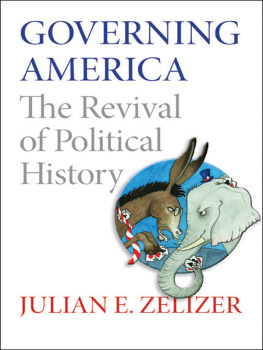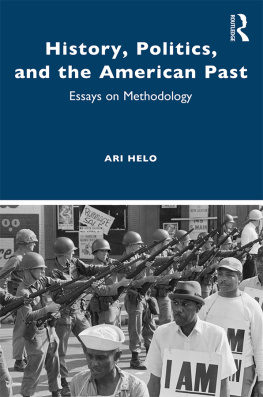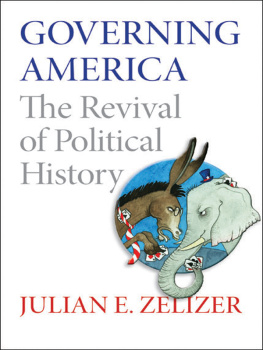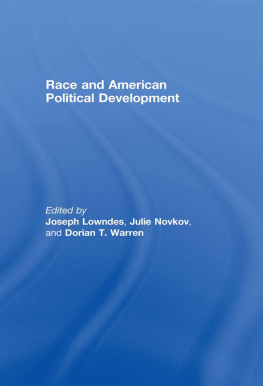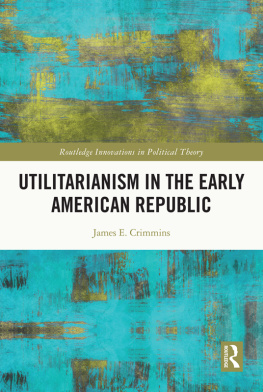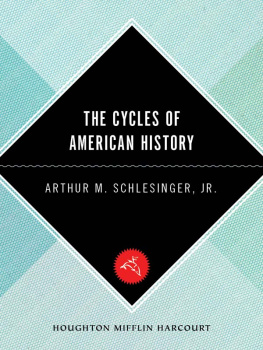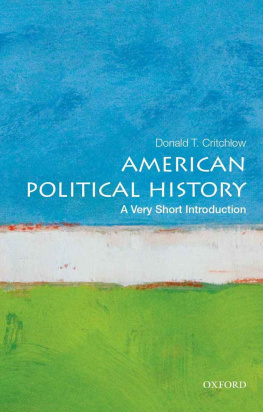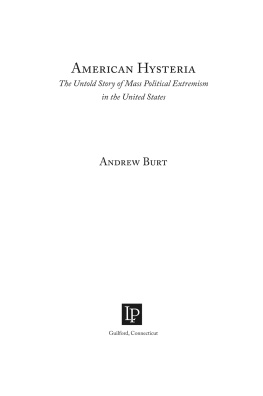Copyright 2012 by Princeton University Press
Published by Princeton University Press, 41 William Street, Princeton, New Jersey 08540 In the United Kingdom: Princeton University Press, 6 Oxford Street, Woodstock, Oxfordshire OX20 1TW
press.princeton.edu
All Rights Reserved
Library of Congress Cataloging-in-Publication Data
Zelizer, Julian E.
Governing America : The revival of political history / Julian E. Zelizer.
p. cm.
Includes bibliographical references and index.
ISBN 978-0-691-15073-4 (hardcover : alk. paper)
1. United StatesPolitics and government. 2. Political cultureUnited StatesHistory. I. Title.
E183.Z45 2011
306.20973dc23
2011029788
British Library Cataloging-in-Publication Data is available
This book has been composed in Minion Pro
Printed on acid-free paper.
Printed in the United States of America
10 9 8 7 6 5 4 3 2 1
Acknowledgments
I would like to thank my editor Clara Platter, who has been enthusiastic about this book since our lunch at Prospect House to discuss the idea. Chuck Myers has done a great job with the manuscript since Clara's departure. Scott Moyers, my literary agent, who is now the publisher at Penguin, helped to negotiate a deal that would make this possible. I would also like to thank Kety McCoach, my assistant at Princeton, who retyped all of these articles and book chapters that appear in the following pages. Over the years, many colleagues have read the pieces in this book and graciously provided me with comments. Numerous foundations and institutions have also given me financial support to conduct the research that resulted in the work found in these pages. The essays have been copyedited so that there are some minor changes from how they originally appeared.
The book is dedicated to all academic mentors at Brandeis University, including JoAnne Brown, Gordon Fellman, David Hackett Fischer, Louis Galambos, Morton Keller, James Kloppenberg, Sidney Milkis, J.G.A. Pocock, Dorothy Ross, and Ronald Walters, who helped guide me as I embarked on this project. Their training at a time when specializing in political history was not the smartest professional move meant the world to me. They inspired me to continue moving forward. I hope they are all proud of the outcome. In addition, I would like to thank the many scholars at other institutions who supported me in this endeavor.
Finally, the two readers of the manuscript provided outstanding suggestions for revision.
The essays in this volume have been copyedited since they were originally published. References are in the format in which they originally appeared.
Governing America: An Introduction
In the spring of 1995, I attended a session at the Organization of American Historians Conference at the Washington Hilton, which focused on the state of political history. When I walked toward the conference room I expected to find a small crowd, and one with little hope for the future.
At the time, the political history field seemed bleak. Senior practitioners, who, for at least two decades, felt that their work had been relegated to the academic dustbin, were demoralized and pessimistic. Graduate students such as myself entered the profession with a sense of trepidation, concerned about how our interests would be received in the academy.
When I entered the meeting room, I was surprised. The panelists spoke to an overflow crowd. The room was filled to capacity. Attendees were standing along the walls, and even outside the door in the hallway peering in. During the discussion, a generational debate opened up. While some of the older panelists and attendees expressed the predictable laments about the demise of the field since the 1960s, younger voices insisted that in fact we were on the cusp of a new era. They pointed to new scholarship that was starting to reenvision how historians wrote about politics by bringing back issues such as public policy and government institutions while integrating these subjects into broader narratives that dealt with social and cultural forces.
It was clear to everyone in the room that something was happening. The electric atmosphere suggested that change might be taking place after decades when U.S. political history had suffered professionally. As it turned out, the younger generation was right.
The problems for political history had begun toward the end of the 1960s, when a new generation of scholars entering the profession developed a stinging critique of political history as it had been practiced by legendary figures such as Arthur Schlesinger Jr. and Richard Hofstadter.
Shaped by the conflicts of the 1960s over civil rights and Vietnam, the scholarly arm of the New Left had argued that political history, as it had been practiced since the founding of the profession in the 1880s, revolved around a narrow group of political elites who did not reflect the experiences of the nation. In the minds of rebellious graduate students, the presidential synthesis had produced a skewed narrative of the American political tradition that ignored intense conflicts over class, race, ethnicity, and gender that had shaped the nation since its founding. The differences separating most presidents were indeed minor, they said, but for them that was a reason to look elsewhere to really explore the national tensions beneath Washington's surface. Claims about a liberal consensus that dampened serious divisions, they said, resulted from only looking at a narrow segment of the nation as opposed to accurately capturing the inherent character of the citizenry.
The social and cultural history revolution that followed in the next two decades pushed scholars to broaden their canvas to emphasize the study of American history from the bottom up and at the local level, focusing on questions like class formation and gender relations rather than political leaders, public policy, or government institutions. Whereas older historians had also understood the impact of social movements on politics, this literature relied on more quantitative precision to assure representative case studies and delved much deeper into local archives to unpack their stories.
French scholarship had an important influence on the rise of social history and the decentering of political history. The Annales school shifted the attention of historians toward the longue dure: big demographic, geographic, and socioeconomic changes that impacted ideational and institutional structures rather than the specific actions of political leaders at given points in time. American social and cultural historians drew on these analytic methods as they turned their attention to similar kinds of issues within the United States, such as the formation of the middle class, the process of urbanization, or the evolution of race relations.
Social and cultural historians produced a wealth of knowledge about the formation of the nation from the bottom up. Instead of finding a country that shared some kind of ideological consensus and lacked the kind of social conflict that characterized Europe, these historians found a nation ridden with tensions over race, gender, and ethnicity. Some of the most vibrant scholarship took place in the field of labor history. Scholars examined the demise of a society where workers had maintained strong control of the shop floor in the nineteenth century to one where management and owners maintained much stronger control. Workers organized in response to the need for protecting certain kinds of wage guarantees and the desire to seek more autonomy in their communities. Cultural historians, who began to thrive in the late 1980s, were interested in studying the construction of ideas. Influenced by anthropology and literary studies, they also looked into the questions of whether cultural media such as films or television were hegemonic forces that shaped social identity or whether Americans brought their own interpretation and meaning to these experiences.

